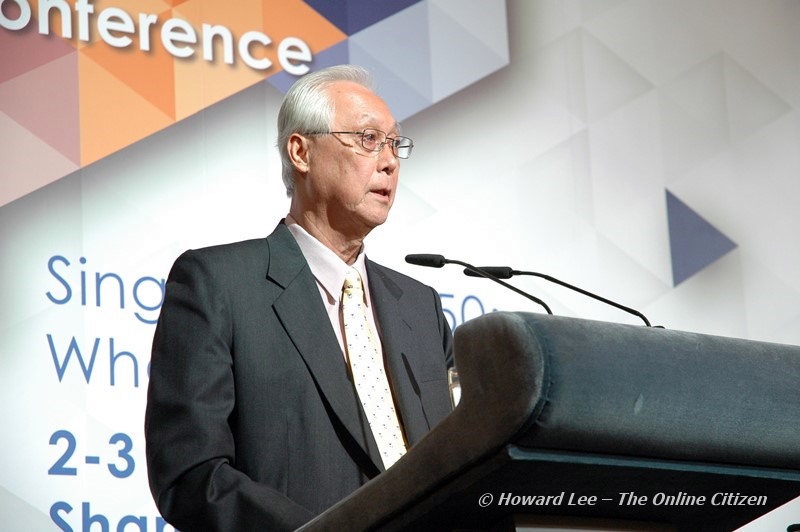At the 2nd Triennial Conference For Grassroots Leaders in Oct 1997, then PM Goh Chok Tong told grassroots leaders, many of them who were also members of PAP, that Singapore must compete to attract “foreign talents” into Singapore.
“Talent is mobile,” Goh said. “Countries now compete to attract talents to their shores.”
He said that if foreign talents do not work in Singapore, they will be contributing to other economies and helping them to compete against Singapore.
“A protectionistic approach will only weaken our competitiveness, and make us poorer. Our children will be the losers, not the winners,” he added.
“Rather than shielding our children from the competition, we should focus on preparing them well to face the competition head on.”
Goh cites Chartered Semiconductor as example
In his 1997 speech, Goh cited Chartered Semiconductor Manufacturing (CSM), a govt-owned company at the time, as a good beneficiary of his “Foreign Talent” policy.
“In the manufacturing sector, we have moved into wafer fabrication in recent years,” he said. “This is the hi-tech end of the semi-conductor industry and where we can be competitive.”
He revealed that CSM had invested $5 billion in four wafer plants.
He explained to the grassroots, “CSM currently employs over 850 Singaporeans, mainly managers, engineers and technicians. But Singaporeans make up only 40% of CSM’s staff strength. The other 60% are foreign talents from 24 countries, coming from as far as Russia and Scotland.”
“Wafer fabrication is a new industry in Singapore. We just do not have enough Singaporeans with the requisite expertise and skills to start the factory and operate it. If we had not tapped the talents of the foreigners, the 850 Singaporeans would not be working in CSM. They would have to compete against other Singaporeans for jobs elsewhere.”
Chartered Semiconductor sold off
As things turned out, the CSM venture was a failure. This was related in a 2015 post on Quora by a Singaporean Ph.D. and consultant Dr Ong Zhun Yong, who used to deal with CSM.
“Chartered basically could not keep up with the development in fabrication technology after the 90 nm node in the mid 2000’s. It had invested relatively little in research & development. This was not a major issue in the 90’s because R&D was not the main bottleneck in business and the technology could be licensed at a reasonable price from overseas,” Dr Ong explained.
“However, as scaling progressed to the 90 and 65 nm node, R&D became much more expensive and Chartered had to pay more for imported technology licensed from companies like IBM. The business also became more capital-intensive with succeeding technological nodes.”
“Ultimately, Chartered found itself increasingly squeezed at both ends of the technological spectrum – at the low end, it had to compete against Chinese fabs that were entering the market and could licence similar technology from IBM while at the high end, it had to shell out more and more money to keep up with its competitors like TSMC. However, Chartered was much smaller than TSMC. This meant that licensing costs ate up a larger proportion of Chartered’s revenue,” Dr Ong revealed.
“The only way Chartered could compete was for it to either expand, necessitating massively more capital investment from Temasek Holdings, or be acquired by another company, which it eventually did as it was sold to GlobalFoundries.”
CSM was later sold to GlobalFoundries in 2009.
Incompetent engineers in CSM
Interestingly, this was what Dr Ong said about the people working in CSM but he did not say if they were foreigners or locals.
“My first job out of college involved helping a lab in Chartered to analyze the uniformity of Boron and Phosphorus doping in its Si wafers. Chartered had very limited ability to do material characterization and relied on outside contractors to do it for them,” Dr Ong recalled helping CSM as a consultant.
“After working with them for a few months, it became painfully clear to me that their engineers did not understand the simple scientific concepts behind materials analysis and made no attempts to understand how they worked even when I offered to explain the concepts to them so that they could better understand the weekly reports that I was sending them.”
“My perception of the scientific backwardness of Chartered was later reinforced by my contact with scientists and engineers who had worked in the R&D labs of leading semiconductor companies like Texas Instruments, Honeywell, Freescale, Samsung, IBM, TSMC, etc,” he added.
“The gulf in scientific competence was enormous, to say the least.”
In other words, Dr Ong as a scientist himself, had observed an “enormous” widening gulf of “scientific competence” between the engineers in leading semiconductor companies and those from CSM.
In any case, Goh’s idea was to import large number of “foreign talents” with the “requisite expertise and skills” to run factories like CSM. He wanted to “tapped the talents of the foreigners”, he told the grassroots leaders in 1997.
But obviously, despite CSM having large number of “foreign talents”, they couldn’t do material characterization and analysis, and had to rely on outside help like Dr Ong, a “native Singlish speaker”, to do it for them.
And eventually, as revealed by Dr Ong, CSM cannot compete technically and had to be sold off, despite having 60% of “foreign talents”, as once proudly disclosed by Goh, working in CSM.






